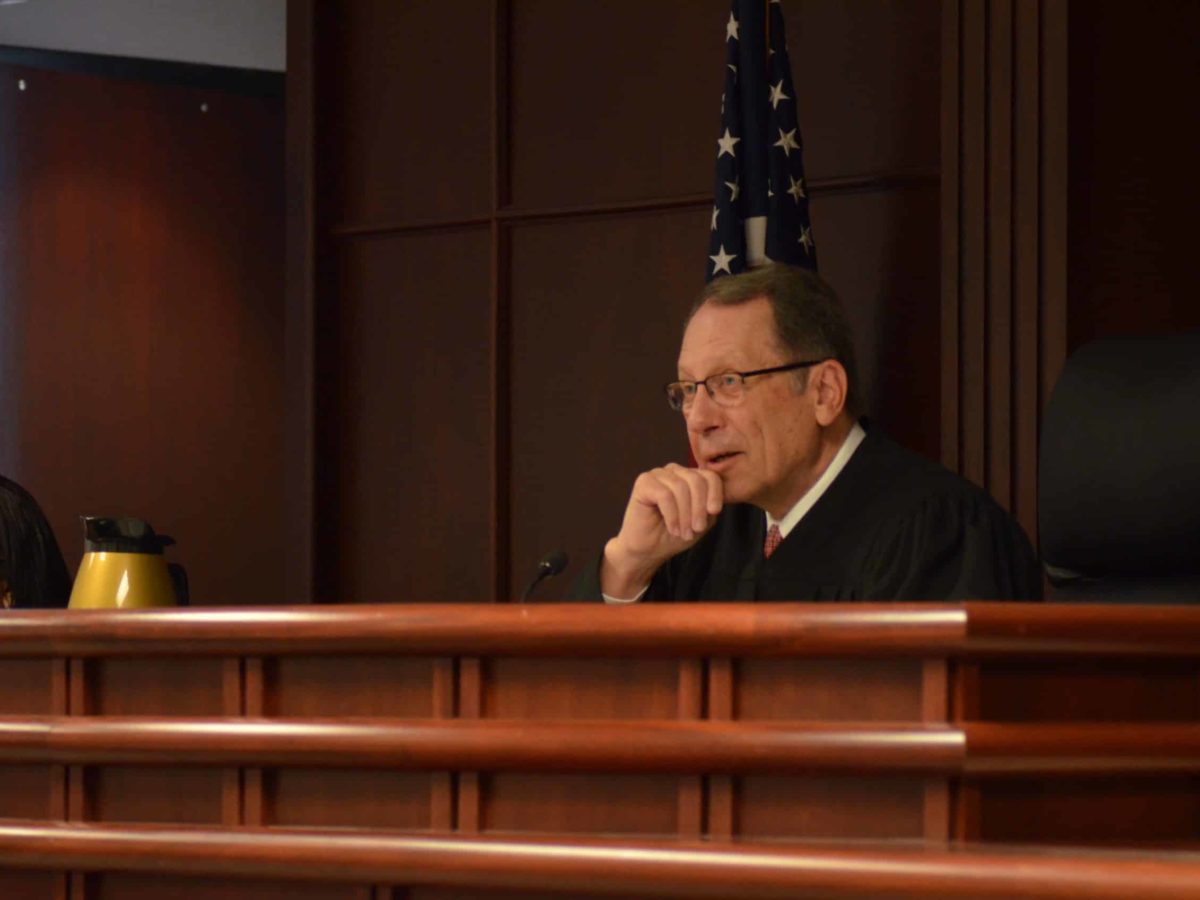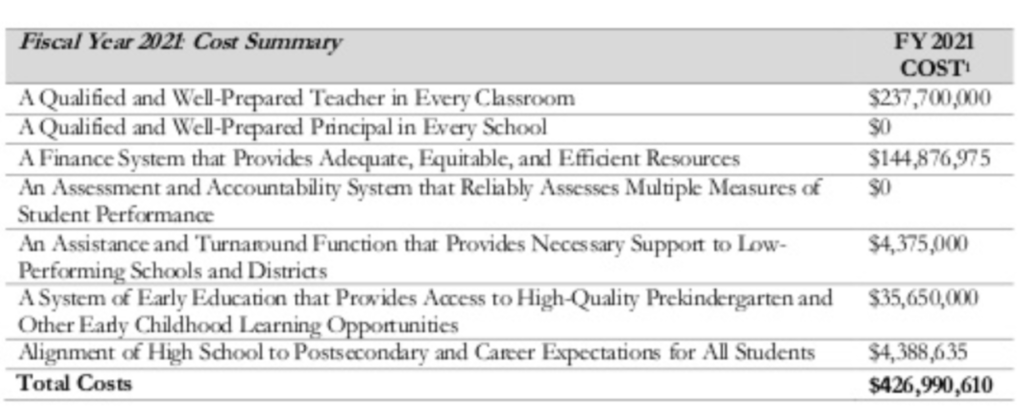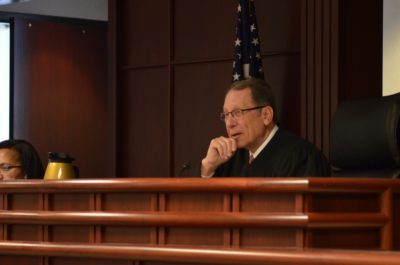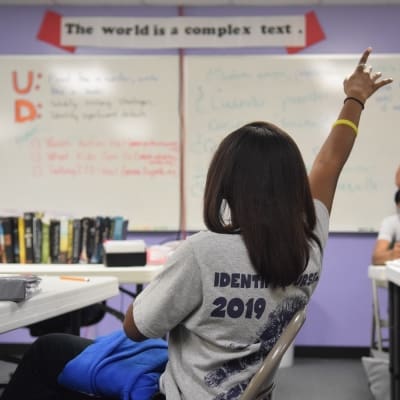

Judge David Lee signed a consent order Tuesday adopting a plan for 2021 in the long-running Leandro court case. The list of items, which calls for spending $426.9 million, is the first step in an eight-year plan to meet the state’s constitutional mandate of providing a sound, basic education to all students.
Lee said in a virtual hearing Tuesday that he hopes Gov. Roy Cooper’s office, the State Board of Education, and the General Assembly will work together to advance the plan.
The Leandro case established that the state has a constitutional obligation to provide every child with a sound, basic education. It began when low-wealth counties sued the state in 1994, claiming their children were not receiving the same educational quality as children in wealthier parts of the state.
“I hope everyone can keep at the floor the concept that we are constitutionally mandated to move these issues forward, and I’m as committed as ever to complying with that constitutional mandate without anybody getting in the way,” said Lee, a Superior Court judge who has overseen the case for nearly four years. “We’ll get through this pandemic, and then we’ll continue to roll.”
The plan lays out immediate investments in teacher preparation and compensation, high-quality early childhood education programs, turnaround strategies for low-wealth schools and districts, postsecondary counseling services for students in low-wealth districts, and tweaks to how funds are allocated. The chart below breaks down the spending proposals.


Outside consultant WestEd released a court-ordered report in December 2019 outlining steps for North Carolina to fulfill its constitutional mandate. In a consent order in January, Lee asked the parties in the case to come up with short, medium, and long-term plans to begin the work.
Because of the COVID-19 pandemic’s effects on students, schools, and communities — as well as its economic impact on the state — the parties in the Leandro case have shifted their immediate priorities. The medium-term plan submitted in June said that if the state could not fund the items in 2021 due to revenue loss, the items should be funded in a following year of an eventual eight-year plan.
“We continued to work together and try to recognize the realities of the pandemic, both in terms of the significant needs in some of these underserved communities that the pandemic created, how it really exacerbated problems that have existed for a number of years, but also working together to recognize the economic impact that the pandemic is having on the state,” said Melanie Black Dubis, the lead counsel for the plaintiff school districts in the suit.
Senate Republicans released a statement Tuesday responding to Lee’s order, saying the legislative leadership has not been part of the process in developing the 2021 plan. The statement references a WRAL interview published last week with Judge Howard Manning, who oversaw the case for much of its history before asking to be removed from it in October 2016.
The statement says that Lee declined an invitation from legislators to speak about education before signing the order and quotes parts of Manning’s interview about focusing on literacy and educational quality rather than money.
“Judge Manning had it exactly right when he blasted the focus on money instead of quality,” Sen. Deanna Ballard, R-Alleghany, said in the release. “Republicans have increased education funding by $1,748 per student, but that doesn’t matter if children aren’t being taught properly. It’s so disappointing that the new Leandro judge, David Lee, wouldn’t even speak to legislators about this issue before issuing a consent order.”
It’s now up to the legislature whether to allocate the funding. Mark Dorosin, a managing attorney at the Lawyers’ Committee for Civil Rights Under Law representing the Charlotte-Mecklenburg branch of the NAACP, said it will be up to the court to decide what happens if the consent order is not followed.
“The Supreme Court in Leandro was clear that the legislative branch and the executive branch have to be given the opportunity and the deference to implement the remedy first, and that’s what we think is happening,” Dorosin said.
Susan Mundry, senior director of learning innovations at WestEd, said the organization is working with the State Board of Education to create an oversight plan. The plaintiffs have chosen WestEd to create a data-driven monitoring process to track the plan’s progress and report to the court on a quarterly basis, with the first report due on December 15.
So what’s in the 2021 plan?
The 2021 plan, embedded above, lays out action items for the next year in each of the seven priority areas Lee outlined in his January consent order:
1. A system of teacher development and recruitment that ensures each classroom is staffed with a high-quality teacher who is supported with early and ongoing professional learning and provided competitive pay.
The 2021 plan recommends expanding the North Carolina Teaching Fellows program to additional educator preparation programs and to cover subject areas outside of its current focuses on STEM and special education.
It calls for expansion of the NC New Teachers Program to 300 more teachers in high-poverty schools, developing a plan to diversify the state’s teacher workforce, creating more advanced teaching roles through grants to districts, and raising salaries for teachers and instructional support staff by an average of 5%.
2. A system of principal development and recruitment that ensures each school is led by a high-quality principal who is supported with early and ongoing professional learning and provided competitive pay.
The 2021 plan calls for the adoption of updated standards to principal licensure requirements, expanding the TP3 principal preparation program to three postsecondary institutions, and developing a plan to create a School Leadership Academy to provide principals with ongoing professional learning opportunities.
3. A finance system that provides adequate, equitable, and predictable funding to school districts and, importantly, adequate resources to address the needs of all North Carolina schools and students, especially at-risk-students as defined by the Leandro decisions.
The 2021 plan prioritizes changes to how funding is allocated to districts, including the removal of funding caps for students with disabilities and students with limited English proficiency, and incrementally increasing the Disadvantaged Student Supplemental Funding (DSSF) allotment.
The plan calls for transferring an allotment for at-risk student services/alternative schools into the DSSF allotment and allowing districts more flexibility in transferring money between allotments.
4. An assessment and accountability system that reliably assesses multiple measures of student performance against the Leandro standard and provides accountability consistent with the Leandro standard.
The 2021 plan prioritizes the expansion of NC Check-Ins to more schools, the addition of different items to those 3-8 grade tests, and the alignment of the Kindergarten Entry Assessment (now called the Early Learning Inventory) with birth through third grade education.
The plan also calls for the implementation of an Innovative Assessment Demonstration pilot through the U.S. Department of Education in 16 districts and charter schools.
It also asks for the adoption of a comprehensive definition of proficiency, the amendment of school performance grades, the inclusion of additional measures in accountability, and the development of a plan to include demographic information of students and staff on school report cards.
5. An assistance and turnaround function that provides necessary support to low-performing schools and districts.
The 2021 plan calls for the implementation of the State Board’s regional support model for supporting low performing and high-poverty schools and creating a plan to provide direct turnaround assistance to chronically low-performing districts.
6. A system of early education that provides access to high-quality pre-kindergarten and other early childhood learning opportunities to ensure that all students at-risk of educational failure, regardless of where they live in the State, enter kindergarten on track for school success.
The 2021 plan prioritizes increasing the N.C. Pre-K reimbursement rates, implementing a feasibility and cost study of a high-quality early learning program, and implementing a study on alternative methodologies for child care subsidy reimbursement.
The plan calls for the expansion of the NC Infant-Toddler program, increasing Smart Start funding, expanding education-based salary supplements for early educators in high-poverty districts, strengthening transitions from early childhood to elementary systems, and funding an early childhood workforce data system.
7. An alignment of high school to postsecondary and career expectations, as well as the provision of early postsecondary and workforce learning opportunities, to ensure student readiness to all students in the state.
The 2021 plan asks for funding for subscriptions to The NROC Project for College Career Ready Graduate course teachers in collaboration with the community college system, funding for approved Cooperative Innovative High Schools and calendar flexibility for those schools, the expansion of the community college system’s career coaches, and matching funds to the College Advising Corps for college advisors in high-poverty districts.



